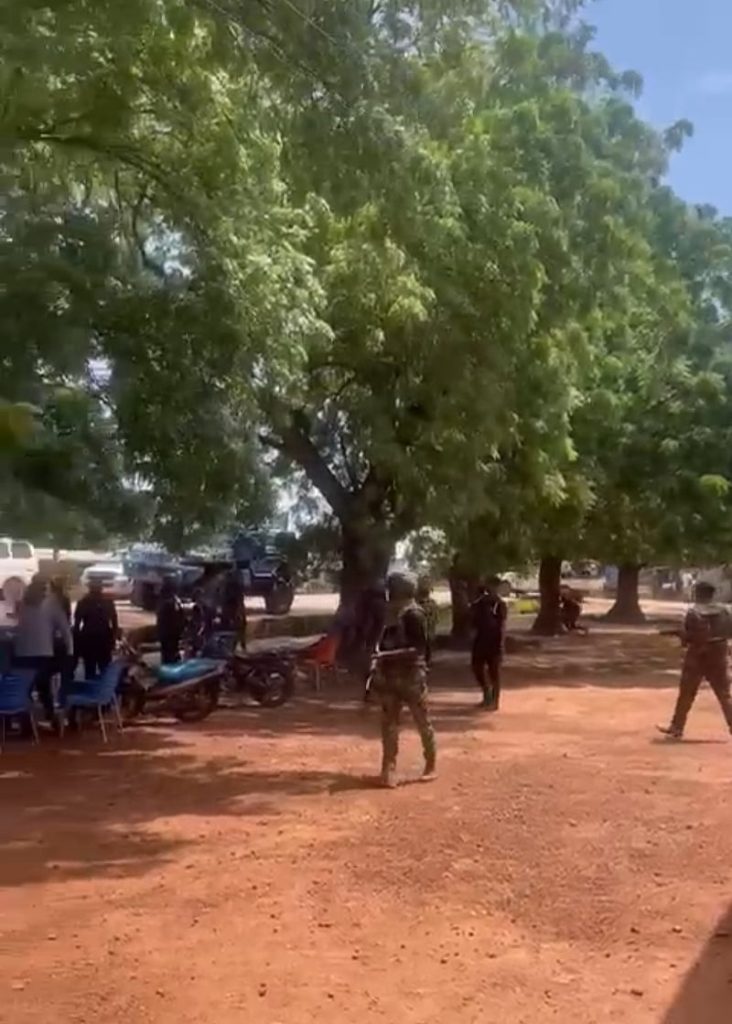On a tense Wednesday afternoon, a significant clash erupted among the Ghana Police, Customs, and military forces stationed in Bawku, Upper East Region, at the Missiga checkpoint. The incident centered around a suspect truck, with the registration number AS 5551-21, which was believed to be involved in smuggling cocoa bags into Togo through the Pulmakom border. Witnesses reported that the confrontation began around 2:45 p.m. and rapidly escalated into a gun battle lasting over 30 minutes, reflecting the high stakes and complexities of law enforcement activities in the region. Local residents expressed concerns over the safety of the area, as the incident highlighted the increasing challenges faced by security agencies in combating smuggling activities.
Details from eyewitness accounts revealed that the truck originated from Kumasi and was loaded with goods thought to be cocoa beans. After passing through the Missiga checkpoint, intelligence alerts prompted police at the Mandago checkpoint in Pusiga District to intercept the vehicle. The apprehension of the truck subsequently ignited a dispute between the police and other security agencies, illustrating jurisdictional conflicts that can arise during law enforcement efforts. The truck was not just loaded with cocoa beans, but also other goods, including biscuits, oil, diapers, and washing powder, which added complexity to the situation as different agencies sought to exert their authority over the inspection process.
When the police at Mandago sought to transfer the vehicle to Bawku Municipality for a detailed inquiry, officers from the Ghana Armed Forces (GAF) and the Ghana Revenue Authority (GRA), stationed at Pulmakom, intervened. They insisted that the truck should be directed to the Pulmakom border for further inspection, which led to a standoff as the police refused to comply. This refusal to yield resulted in an escalation of tensions among the security forces, reflecting the often fraught relationship between various agencies tasked with enforcing laws and regulations in the region.
As the confrontation unfolded, the situation rapidly deteriorated, culminating in an armed exchange of gunfire when the police fired shots. In retaliation, GRA officers and supporting military personnel from the Bazua camp returned fire, escalating the violence in a conflict that underscored the potential for lethal outcomes in governmental disputes over jurisdiction and authority. Despite the chaotic and dangerous nature of the clash, it was reported that no casualties occurred, which was a fortunate outcome considering the circumstances.
After approximately 30 minutes of standoff, an agreement was finally reached among the involved security forces. Subsequently, a thorough search of the truck was conducted, confirming the presence of 20 bags of cocoa beans among the assorted goods it carried. Following this discovery, the truck was officially released to the GRA for more extensive investigation. This resolution not only illustrated the importance of cooperation between different security agencies but also highlighted ongoing issues related to smuggling in the region, which remains a significant concern for law enforcement authorities.
As investigations into the attempted smuggling continue, the incident in Bawku serves as a stark reminder of the challenges faced by law enforcement in dealing with organized smuggling networks. The underlying tensions illustrated by the confrontation reflect a broader struggle against illicit trade activities that jeopardize the economy and legal frameworks. The Ghanaian government’s response and measures taken to prevent future occurrences will be critical in assessing the effectiveness of their approach to border security and the regulation of trade in commodities like cocoa, which is vital to the nation’s economy.


